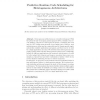Free Online Productivity Tools
i2Speak
i2Symbol
i2OCR
iTex2Img
iWeb2Print
iWeb2Shot
i2Type
iPdf2Split
iPdf2Merge
i2Bopomofo
i2Arabic
i2Style
i2Image
i2PDF
iLatex2Rtf
Sci2ools
165
click to vote
HIPEAC
2009
Springer
2009
Springer
Predictive Runtime Code Scheduling for Heterogeneous Architectures
Heterogeneous architectures are currently widespread. With the advent of easy-to-program general purpose GPUs, virtually every recent desktop computer is a heterogeneous system. Combining the CPU and the GPU brings great amounts of processing power. However, such architectures are often used in a restricted way for domain-specific applications like scientific applications and games, and they tend to be used by a single application at a time. We envision future heterogeneous computing systems where all their heterogeneous resources are continuously utilized by different applications with versioned critical parts to be able to better adapt their behavior and improve execution time, power consumption, response time and other constraints at runtime. Under such a model, adaptive scheduling becomes a critical component. In this paper, we propose a novel predictive user-level scheduler based on past performance history for heterogeneous systems. We developed several scheduling policies and...
Heterogeneous Architectures | Heterogeneous Computing Systems | Heterogeneous Systems | HIPEAC 2009 | System Software |
Related Content
| Added | 19 May 2010 |
| Updated | 19 May 2010 |
| Type | Conference |
| Year | 2009 |
| Where | HIPEAC |
| Authors | Víctor J. Jiménez, Lluís Vilanova, Isaac Gelado, Marisa Gil, Grigori Fursin, Nacho Navarro |
Comments (0)

